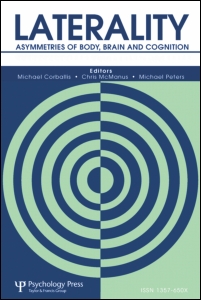Publicado artículo en LATERALITY

El pasado 28 de agostó se publicó online en la prestigiosa revista "Laterality: Asymmetries of Body, Brain and Cognition " un artículo sobre la investigación llevada a cabo en Fundación Mona sobra lateralización manual y especialización hemisférica en chimpancés.
Este proyecto de investigación fue llevado a cabo conjuntamente por miembros del IPHES , Fundación Mona, URV y el Centro UCM-ISCII de Evolución y Comportamiento Humanos.
En los próximos meses saldrá publicado en la edición en papel de la revista británica, editada por Psychology Press.
Adjunto la referencia y el abstract del artículo:
Mosquera, M., Llorente, M., Riba, D., Estebaranz, F., Gonzalez, M., Lorenzo, C., Sanmart, N., Toll, M., Carbonell, E., & Feliu, O. (2006). Ethological study of manual laterality in naturalistic housed chimpanzees (Pan troglodytes) from the Mona Foundation Sanctuary (Girona, Spain). Laterality, in press.
Título:
Ethological study of manual laterality in naturalistic housed chimpanzees (Pan troglodytes) from the Mona Foundation Sanctuary (Girona, Spain).
Autores:
Marina Mosquera1, Miquel Llorente2,3, David Riba1, Ferran Estebaranz3, Mar González-Brao3, Carlos Lorenzo1,4, Neus Sanmartí3, Macarena Toll3, Eudald Carbonell1,2 y Olga Feliu3.
Filiación:
1 Universitat Rovira i Virgili, Tarragona, Spain
2 Institut Català de Paleoecologia Humana i Evolució Social (IPHES), Tarragona, Spain
3 Unitat de Recerca i Laboratori d’Etologia, Fundació Mona, Girona, Spain
4 Centro UCM-ISCIII de Evolución y Comportamiento Humanos, Madrid, Spain
Referencia:
Laterality, (in press).
Publicado online el 28 de agosto de 2006 (http://www.tandf.co.uk/journals/titles/1357650X.asp).
DOI: 10.1080/13576500600886754
Print ISSN: 1357-650X
Online ISSN: 1464-0678
Abstract:
During recent years, handedness of nonhuman primates has been the subject of several studies, especially focused on our closest relatives: the chimpanzees. These studies have dealt with both wild and captive chimpanzees, and they seem to point to divergent conclusions, which have been interpreted as a by-product of the human influence in the captive samples. Here we present the results of a study of 10 chimpanzees (Pan troglodytes). In the past, they were trained in circus and marketing tasks (humanised behaviours), until they were confiscated and accepted into the Mona Foundation (in northeast Spain) in 2000, where they live in a semi-naturalistic environment. This study has been performed through observational bouts without systematic human influence, recording the actions carried out by chimpanzees when performing spontaneous activities. Our results indicate that chimpanzees that were under strong human influence in the past show the same trend in handedness as those living in freedom: few significant lateralities were observed among either individuals or tasks. So, laterality may not be influenced by humanisation. However, this conclusion must be taken as preliminary because very few individuals were studied.
Contacto:
Miquel Llorente
Correo electrónico: mllorente@fmrecerca.org
0 comentarios